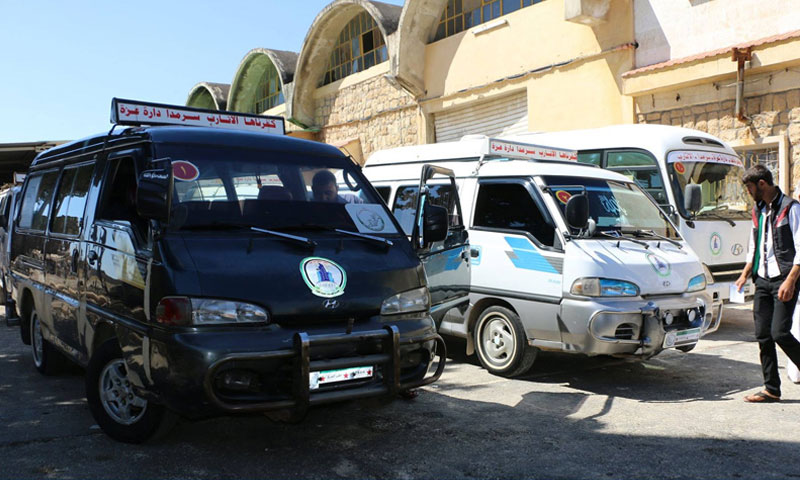



With the absence of the government’s censorship of the service sectors in Idlib governorate, a chaos has resulted in terms of defining the transportation fees, the constant rise of which is enhancing the governorate people’s suffering.
The transportation sector in Idlib governorate, the rural parts in particular, is controlled by the mood of the driver, which designates the fees without administrative supervision to specify the prices or regulate the phenomenon.
Under the deteriorating economic situation, the people’s complaints are increasing in objection to the persistent rise in the transportation fees, which is sometimes estimated with the double of the reasonable tariffs.
In Idlib and the rural parts surrounding it, more than 4.7 million persons live, according to the latest census of the population issued by the “Response Coordination” team on November 8.
The transportation fees in Idlib governorate are exhausting the people, in addition to the laziness of the daily transportation movement due to the military checkpoints in the area and the lack of demand on transportation means, which forces the drivers into long hours of waiting for passengers.
“Um Mustafa,” a woman from the town of Ariha, located 15 kilometers from the governorate’s center, told Enab Baladi: “Ten years ago, the duration between the bus station and Idlib was about a quarter of an hour, for 5 Syrian pounds (the equivalent to 10 cents back then). However, today the fee is more than 400 Syrian pounds (about a dollar), and the drivers are not even convinced.”
“We wait in the bus for about three of four hours sometimes. In the end, the driver takes a hundred Syrian pounds in addition to the fee,” Said “Um Mustafa”, explaining that “this is on the allegation that the bus is not full, which is a loss to the driver.”
The long waiting on the part of the drivers for their buses to be filled with passengers, results in the boredom and vexation of the latter, who are late to their jobs, according to Mohammad al-Sayed, from the city of Maarrat al-Nu’man, rural Idlib, who replaced the transportation means with a motorcycle in summer, to be forced to using them in the winter.
The governorate’s students are also coerced to contract with private cars every day to go to their schools and universities, which Batoul Hamoudah, student at the Idlib University and a resident of the Jisr al-Shughur, does. She says: “A number of my colleagues from the neighboring villages and I have contracted with a driver to transport us every day to the area where Idlib University is located in return for two thousand Syrian pounds per student for the journey back and forth.”
“Abu Yazan”, a driver on the Idlib-Sarmada road, believes that the journey is a loss when it kicks off without the bus being full of passengers, so he covers the shortage by increasing the fees he receives from the passengers.
“The fee for transportation from Idlib to Sarmada is a thousand Syrian pounds, while it might reach 1500 Syrian pounds to the city of al-Dana, which my fellow drivers and I have agreed upon, in case the number of the passengers was complete,” Abu Yazan told Enab Baladi.
The fee might double in case of passengers’ shortage, according to “Abu Yazan”, who describes the fees as “reasonable” compared to the fuel prices (currently the price of Mazout varies between 200 to 300 hundred Syrian pounds per liter) and the taxes imposed on each station, which might be a monthly 500 pounds.
For its part, the “Salvation” Government, running the governorate, said that, under the decision of the Ministry of the Economy and Commerce, has formed a committee to set up the fee for each of the transportation lines within the governorate, in a step, through which, the government attempts to find solutions for many of the problems relating to this, according to Ibrahim Radwan, the director of the Media Office of the Government.
In an interview with Enab Baladi, Radwan said that this step is undertaken by the Government to regulate the transportation activities, through an announcement done via the Transportation Directorate, as a first step under the process of “supplying the vehicles with license plates in stages, as to accelerate the regulation process and the control of the fee in a manner that meets the people’s aspirations.”
The committee consists of representatives of the Transportation, Economy and Interior Directorates and the Local Administration, as well as a driver from each of the lines to specify a fee compatible with the fuel prices, a meeting that has to be conducted repeatedly to study and adopt a unified fee that goes with the changes of the fuel price.
The “Salvation Government” is responsible for Idlib governorate in relation to administrative and security sectors, following the decline of the “Interim Government’s” influence after the “Tahrir al-Sham” has taken over the area tow years ago.
if you think the article contain wrong information or you have additional details Send Correction